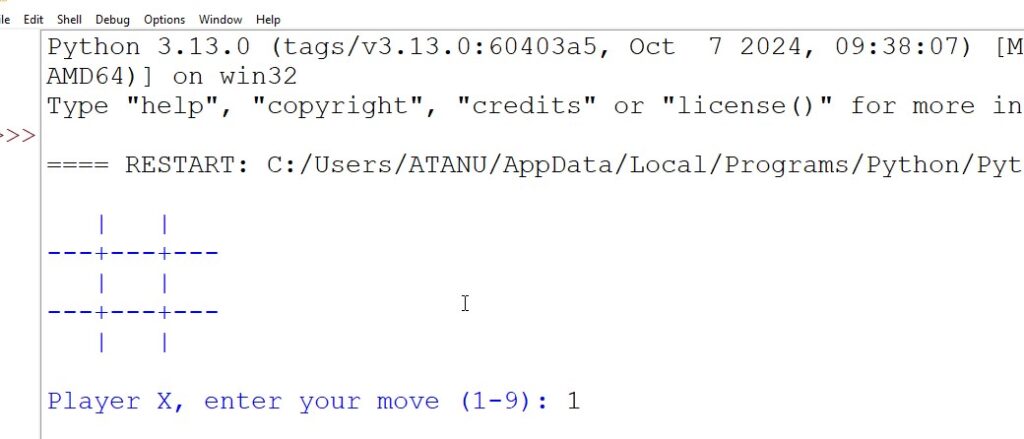Tic-Tac-Toe is a simple and fun game that can be easily implemented in Python. In this article, we will build a command-line version of Tic-Tac-Toe step by step.

Steps to Create Tic-Tac-Toe in Python
- Create the game board
- Take user input
- Check for a win or draw
- Switch players
- Loop until the game ends
Full Python Code for Tic-Tac-Toe
# Initialize the board
def create_board():
return [' '] * 9
def display_board(board):
print(f"\n {board[0]} | {board[1]} | {board[2]} ")
print("---+---+---")
print(f" {board[3]} | {board[4]} | {board[5]} ")
print("---+---+---")
print(f" {board[6]} | {board[7]} | {board[8]} \n")
def check_winner(board, player):
win_patterns = [(0, 1, 2), (3, 4, 5), (6, 7, 8), (0, 3, 6), (1, 4, 7), (2, 5, 8), (0, 4, 8), (2, 4, 6)]
return any(board[i] == board[j] == board[k] == player for i, j, k in win_patterns)
def is_draw(board):
return ' ' not in board
def tic_tac_toe():
board = create_board()
player = 'X'
while True:
display_board(board)
move = int(input(f"Player {player}, enter your move (1-9): ")) - 1
if board[move] != ' ':
print("Invalid move! Try again.")
continue
board[move] = player
if check_winner(board, player):
display_board(board)
print(f"Player {player} wins!")
break
if is_draw(board):
display_board(board)
print("It's a draw!")
break
player = 'O' if player == 'X' else 'X'
if __name__ == "__main__":
tic_tac_toe()

Explanation of the Tic-Tac-Toe Code
This Python code implements a simple Tic-Tac-Toe game that runs in the command line. Below is a step-by-step explanation of each function and how they work together.
1. Initializing the Board
def create_board():
return [' '] * 9
- This function creates an empty 3×3 board using a list with 9 spaces (‘ ‘).
- The board is represented as a list of 9 elements, corresponding to positions 1-9.
2.Displaying the Board
def display_board(board):
print(f"\n {board[0]} | {board[1]} | {board[2]} ")
print("---+---+---")
print(f" {board[3]} | {board[4]} | {board[5]} ")
print("---+---+---")
print(f" {board[6]} | {board[7]} | {board[8]} \n")
This function prints the current state of the board in a structured format.
The board is displayed as
X | O | X
---+---+---
O | X | O
---+---+---
X | O | X
The list indices correspond to positions 1-9 as entered by the player.
3.Checking for a Winner
def check_winner(board, player):
win_patterns = [(0, 1, 2), (3, 4, 5), (6, 7, 8),
(0, 3, 6), (1, 4, 7), (2, 5, 8),
(0, 4, 8), (2, 4, 6)]
return any(board[i] == board[j] == board[k] == player for i, j, k in win_patterns)
- The function checks if a player has won.
- The winning combinations are stored in
win_patternsas tuples representing indices. - Example winning patterns:
- Rows:
(0,1,2),(3,4,5),(6,7,8) - Columns:
(0,3,6),(1,4,7),(2,5,8) - Diagonals:
(0,4,8),(2,4,6)
- Rows:
- It checks if all positions in any of these patterns have the same player marker (‘X’ or ‘O’).
4.Checking for a Draw:
def is_draw(board):
return ' ' not in board
This function checks if the board is full.If there are no empty spaces (' '), and no one has won, it declares a draw.
5.Main Game Logic:
def tic_tac_toe():
board = create_board()
player = 'X'
while True:
display_board(board)
move = int(input(f"Player {player}, enter your move (1-9): ")) - 1
if board[move] != ' ':
print("Invalid move! Try again.")
continue
board[move] = player
if check_winner(board, player):
display_board(board)
print(f"Player {player} wins!")
break
if is_draw(board):
display_board(board)
print("It's a draw!")
break
player = 'O' if player == 'X' else 'X'
Explanation of Game Loop:
- Create a fresh board using
create_board(). - Set the first player as
'X'. - Loop until the game ends:
- Display the board.
- Ask the current player to enter a move (
1-9). - Check if the move is valid (empty space).
- Update the board with the player’s marker.
- Check if the player has won.
- Check if the board is full (draw).
- Switch players between
'X'and'O'.
6.Running the Game:
if __name__ == "__main__":
tic_tac_toe()
The game starts when the script is run.
Game Flow Example
Input & Output:
1 | 2 | 3
---+---+---
4 | 5 | 6
---+---+---
7 | 8 | 9
Player X, enter your move (1-9): 1
X | 2 | 3
---+---+---
4 | 5 | 6
---+---+---
7 | 8 | 9
Player O, enter your move (1-9): 5
X | 2 | 3
---+---+---
4 | O | 6
---+---+---
7 | 8 | 9
Players take turns entering numbers to place X or O.The game continues until someone wins or all spaces are filled.
Conclusion
This Tic-Tac-Toe implementation demonstrates basic programming concepts:
- Lists for board representation
- Loops for user input
- Conditionals for game logic
- Functions for modular code
You can enhance it by:
- Adding an AI opponent
- Improving input validation
- Creating a graphical version (GUI) with
tkinterorpygame.
